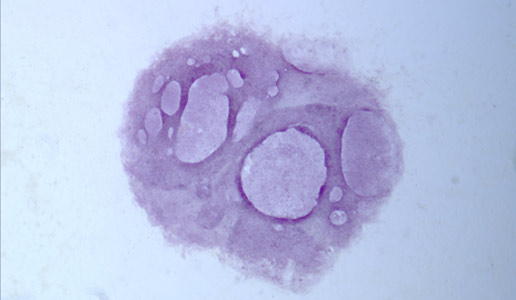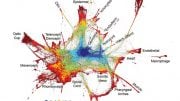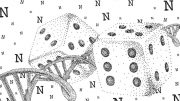
A colony of embryonic-like cells form after activation of a gene variant only found in humans, essentially reprogramming mature cells. Credit: Yale University
Yale researchers have discovered a gene that turns back the cellular clock, greatly aiding the reprogramming of mature cells.
An exhaustive analysis of factors that allow mature cells to become like embryonic stem cells again has revealed a spliced form of a gene found only in primates that greatly aids the reprogramming of mature cells.
The discovery of a human-specific gene involved in such a fundamental process as the creation of a pluripotent cell, one that can become a variety of tissue types, surprised Yale researchers. The gene called CCNE1 is normally involved in cell cycling, but the variant CCNE1 does not appear to play that role and instead appears critical for reprogramming. It is also unclear why the gene is found only in primate cells.
The Yale team, led by geneticist In-Hyun Park, is studying how mature cells can be reprogrammed back to their embryonic state. The goal of the research is to better understand the processes of cell fate change and one day develop customized cell therapies for individual patients.
The Yale team used a new form of transcriptome analysis that allowed them to more fully explore the impact of all types of RNA on cell reprogramming. The work will be published in the June 6 issue of Stem Cell Reports.
Reference: “Transcriptome Signature and Regulation in Human Somatic Cell Reprogramming” by Yoshiaki Tanaka, Eriona Hysolli, Juan Su, Yangfei Xiang, Kun-Yong Kim, Mei Zhong, Yumei Li, Kartoosh Heydari, Ghia Euskirchen, Michael P. Snyder, Xinghua Pan, Sherman Morton Weissman and In-Hyun Park, 21 May 2015, Stem Cell Reports.
DOI: 10.1016/j.stemcr.2015.04.009









Be the first to comment on "CCNE1 Gene Turns Back Cellular Clock"